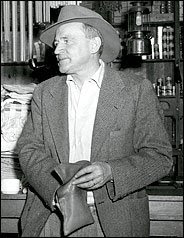
Merian Caldwell Cooper was an American aviator, United States Air Force and Polish Air Force officer, adventurer, director, screenwriter and producer.
Cooper's most famous film work was the 1933 movie King Kong.
Cooper was the father of Polish translator and writer Maciej Słomczyński and was married to Dorothy Jordan.
Born to John C. Cooper, of distant English descent, and the former Mary Caldwell, Merian Caldwell Cooper entered the U.S. Naval Academy in 1912 but left in 1915 (his senior year). In 1916 he joined the Georgia National Guard to help chase Pancho Villa in Mexico.
Cooper was a bomber pilot during World War I. He was shot down and captured by the Germans, serving out the remainder of the war in a POW camp.
From late 1919 until the 1921 Treaty of Riga he was a member of a volunteer American flight squadron, the Kościuszko Squadron, which supported the Polish Army in the Polish-Soviet War. On July 26, 1920, his plane was shot down, and he spent nearly 9 months in a Soviet prisoner of war camp. He escaped just before the war was over and made it to Latvia. For valor he was decorated by Polish commander-in-chief Józef Piłsudski with the highest Polish military decoration, the Virtuti Militari.
During his time as a POW, Cooper wrote an autobiography: Things Men Die For by "C". He turned the manuscript over to Dagmar Matson to type for publisher submission. It was submitted to G. P. Putnam's Sons in New York (the Knickerbocker Press) in 1927 and published that same year. Just after the book's release, he changed his mind about releasing the personal details about "Nina" and asked Dagmar to buy up every copy she could find. She managed to acquire most of the 5,000 copies that had been released. Cooper kept a copy and Dagmar kept a copy, while the rest were eventually destroyed. Dagmar sent Nina money every month, on behalf of Cooper, until his death.
Though old enough to be free of service in World War II, he enlisted anyway, commissioned as a colonel in the U.S. Army Air Forces, serving in China as chief of staff for General Claire Chennault of the China Air Task Force — better known as the "Flying Tigers", then from 1943 to 1945 in the Southwest Pacific as chief of staff for the Fifth Air Force's Bomber Command.
Leading many missions and carefully planning them to minimize loss of life, he was known for his hard work and relentless planning. At the end of the war, he was promoted to brigadier general. For his contributions, he was also aboard the USS Missouri to witness Japan's surrender.
Cooper led movie production for RKO Radio Pictures before and after World War II. He frequently collaborated with Ernest B. Schoedsack. Cooper also served as vice president in charge of production for Pioneer Pictures from 1934 to 1936, and vice president of Selznick International Pictures in 1936–1937, before moving to Metro-Goldwyn-Mayer.
Cooper started his film career with documentaries for Paramount Pictures such as Grass (1925) and Chang (1927), which combined real footage with staged sequences. In Chang , he used this technique to create a memorable finale featuring an elephant stampede. His movie The Four Feathers was filmed among the fighting tribes of the Sudan.
Throughout his career, Cooper was a proponent of technical innovation. The film King Kong, which he co-wrote, co-directed, and appeared in, was a breakthrough in this regard. Another outstanding film that he produced in trying to follow up on his success with King Kong was the 1935 film She. Additionally, Cooper helped pave the way for such ground-breaking technologies as Technicolor and the widescreen process Cinerama.
Cooper was a good friend and frequent collaborator with noted Western director John Ford. In 1947, they formed Argosy Productions and produced such notable films as Wagon Master (1950), Rio Grande (1950), The Quiet Man (1952), and The Searchers (1956). He was nominated for an Academy Award for producing The Quiet Man in 1952, but lost to Cecil B. DeMille's The Greatest Show on Earth. Cooper did however receive an Honorary Oscar that same year.

No comments:
Post a Comment